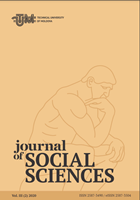CONCEPTUAL APPROACHES AND THE EFFECTS OF CIRCULAR ECONOMY
CONCEPTUAL APPROACHES AND THE EFFECTS OF CIRCULAR ECONOMY
Author(s): Rafael Ciloci, Maria Gheorghiţa, Iuliu ŢurcanSubject(s): Supranational / Global Economy, Energy and Environmental Studies, Economic development, Socio-Economic Research
Published by: Universitatea Tehnică a Moldovei
Keywords: linear economy; circular economy; classical approach; neoclassical approach; sustainable development approach; circular economy approach;
Summary/Abstract: Nowadays at the international level special attention is drawn to sustainable development, based on the transition from the linear economy to the circular one and considering that the concept of circular economy is still underexamined, in this research is proposed to examine different conceptual approaches of the circular economy, highlighting the major discrepancies between the linear and the circular economy, as well as the multidimensional impact of the implementation on the circular economy. The linear economy that considers the natural resources inexhaustible, being relevant for the entire period of the development of humanity is no longer valid. At the moment there are major imbalances that endanger the very existence of humanity, and the reorientation towards the circular economy determines a consumption model that involves the reduction and waste recycling, ensures the ecological design and implicitly the improvement of life quality. "Closing the circle" of production-consumption is a future-oriented agenda, which ensures sustainable development in the conditions of globally population growth and induce higher life quality. The circular economy is a modern economic approach, determined by the socio-economic evolution and the aggravation of the ecological problems. It is a paradigm that aims to maintain the balance between consumption and resources, society and nature.
Journal: Journal of Social Sciences
- Issue Year: III/2020
- Issue No: 2
- Page Range: 13-22
- Page Count: 10
- Language: Romanian

